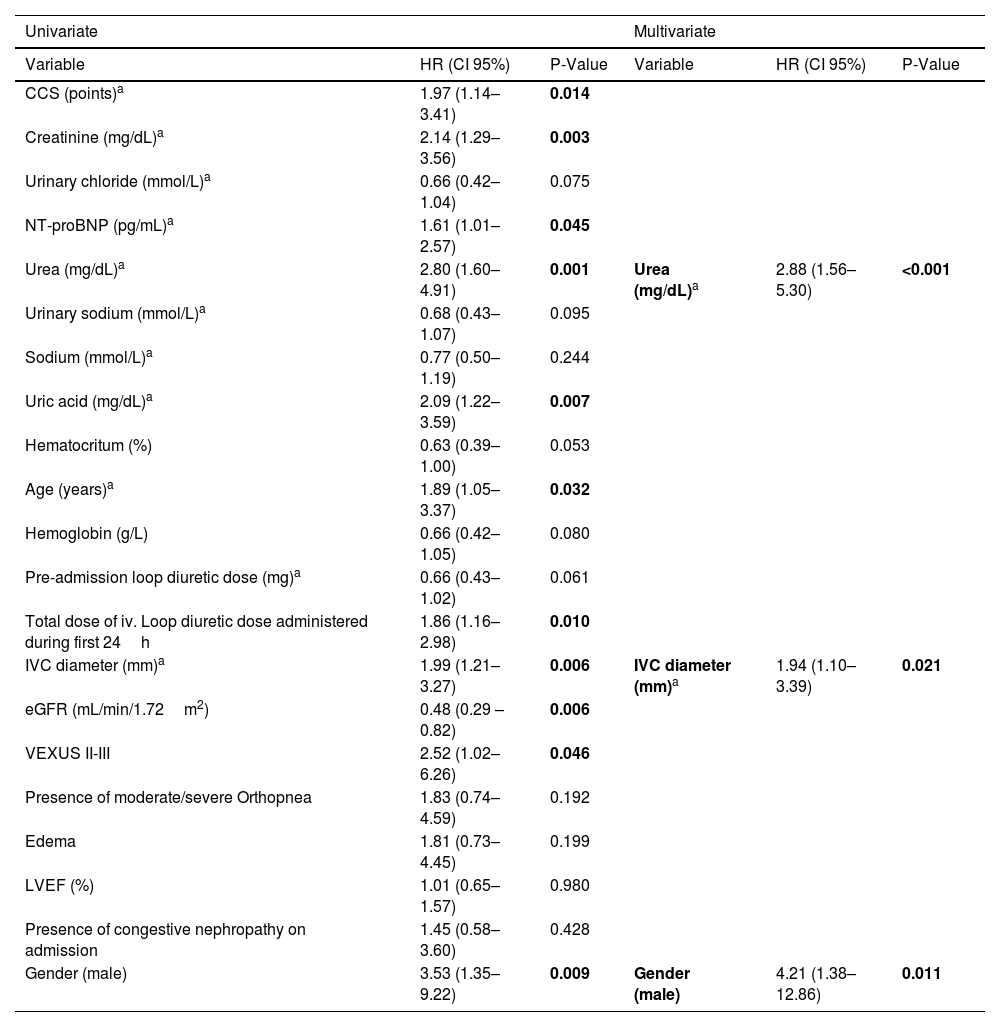Multimodal assessment of congestion and venous excess ultrasound protocol (VExUS) play a determinant role for volume assessment and decongestive therapy in patients with acute heart failure (AHF).
MethodsProspective, unicentrical and observational study in patients admitted for AHF at the Internal Medicine ward, designed to explore the prevalence, predictors and clinical outcomes of congestion (VExUS score) and the prevalence of congestive nephropathy.
ResultsA total of 100 patients were included (mean age 86±8 years were and 51% females). According to VExUS protocol, 49% exhibited moderate to severe congestion (VExUS 2-3). These patients were more clinical congested, showed higher concentrations of CA125 and microalbumin/creatinine ratio, and need greater doses of loop diuretics during hospitalization. The prevalence of congestive nephropathy on admission was 38%. Patients with VExUS score on admission ≥ 2 had a 2.5-fold increased risk for all-cause mortality and/or HF hospitalization at 1year (OR 2.52, 95% CI 1.02–6.26, p=0.046). In multivariable analysis elevated urea levels, larger inferior vena cava diameter and male gender, were identified as independent predictors on top of VExUS score for one-year mortality with an area under the curve for the final model of 0.740 (p<0.001).
ConclusionsModerate to severe congestion (VExUS grade 2-3) is associated with higher clinical congestion scores, greater need for diuretic treatment, and worse clinical outcomes, including increased mortality and rehospitalization rates in AHF. Furthermore, one-third of AHF showed congestion nephropathy a situation with clinical relevance that can influence decongestive treatments and final outcomes.
La evaluación multimodal de la congestión y el protocolo ecográfico de exceso venoso (VExUS) desempeñan un papel determinante en la evaluación del volumen y la terapia descongestiva en pacientes con insuficiencia cardíaca aguda (ICA).
MétodosEstudio prospectivo, unicéntrico y observacional en pacientes ingresados por ICA en la planta de Medicina Interna, diseñado para explorar la prevalencia, los predictores y los resultados clínicos de la congestión (puntuación VExUS) y la prevalencia de la nefropatía congestiva.
ResultadosSe incluyeron 100 pacientes (edad media de 86±8 años, 51% mujeres). Según el protocolo VExUS, el 49% presentó congestión moderada a grave (VExUS 2−3). Estos pacientes presentaron mayor congestión clínica, mayores concentraciones de CA125 y un cociente microalbúmina/creatinina, y requirieron mayores dosis de diuréticos de asa durante la hospitalización. La prevalencia de nefropatía congestiva al ingreso fue del 38%. Los pacientes con una puntuación VExUS al ingreso ≥ 2 tuvieron un riesgo 2,5 veces mayor de mortalidad por cualquier causa y/o hospitalización por IC al año (OR 2,52; IC del 95%: 1,02-6,26; p=0,046). En el análisis multivariable, los niveles elevados de urea, el mayor diámetro de la vena cava inferior y el sexo masculino se identificaron como predictores independientes, además de la puntuación VExUS, para la mortalidad a un año, con un área bajo la curva para el modelo final de 0,740 (p<0,001).
ConclusionesLa congestión moderada a grave (VExUS grado 2-3) se asocia con puntuaciones de congestión clínica más altas, mayor necesidad de tratamiento diurético y peores resultados clínicos, incluyendo un aumento de la mortalidad y las tasas de rehospitalización en la ICA. Además, un tercio de los casos de ICA presentaron nefropatía por congestión, una situación clínicamente relevante que puede influir en los tratamientos descongestivos y los resultados finales.
Article
Diríjase desde aquí a la web de la >>>FESEMI<<< e inicie sesión mediante el formulario que se encuentra en la barra superior, pulsando sobre el candado.

Una vez autentificado, en la misma web de FESEMI, en el menú superior, elija la opción deseada.

>>>FESEMI<<<












